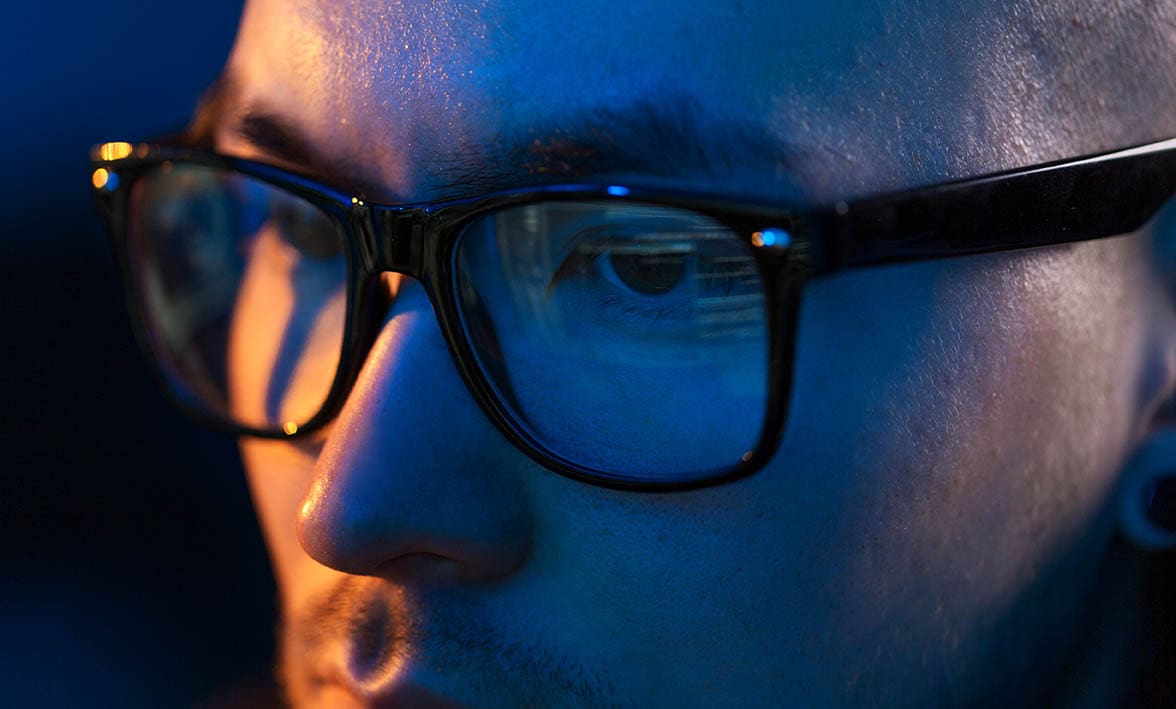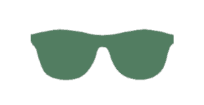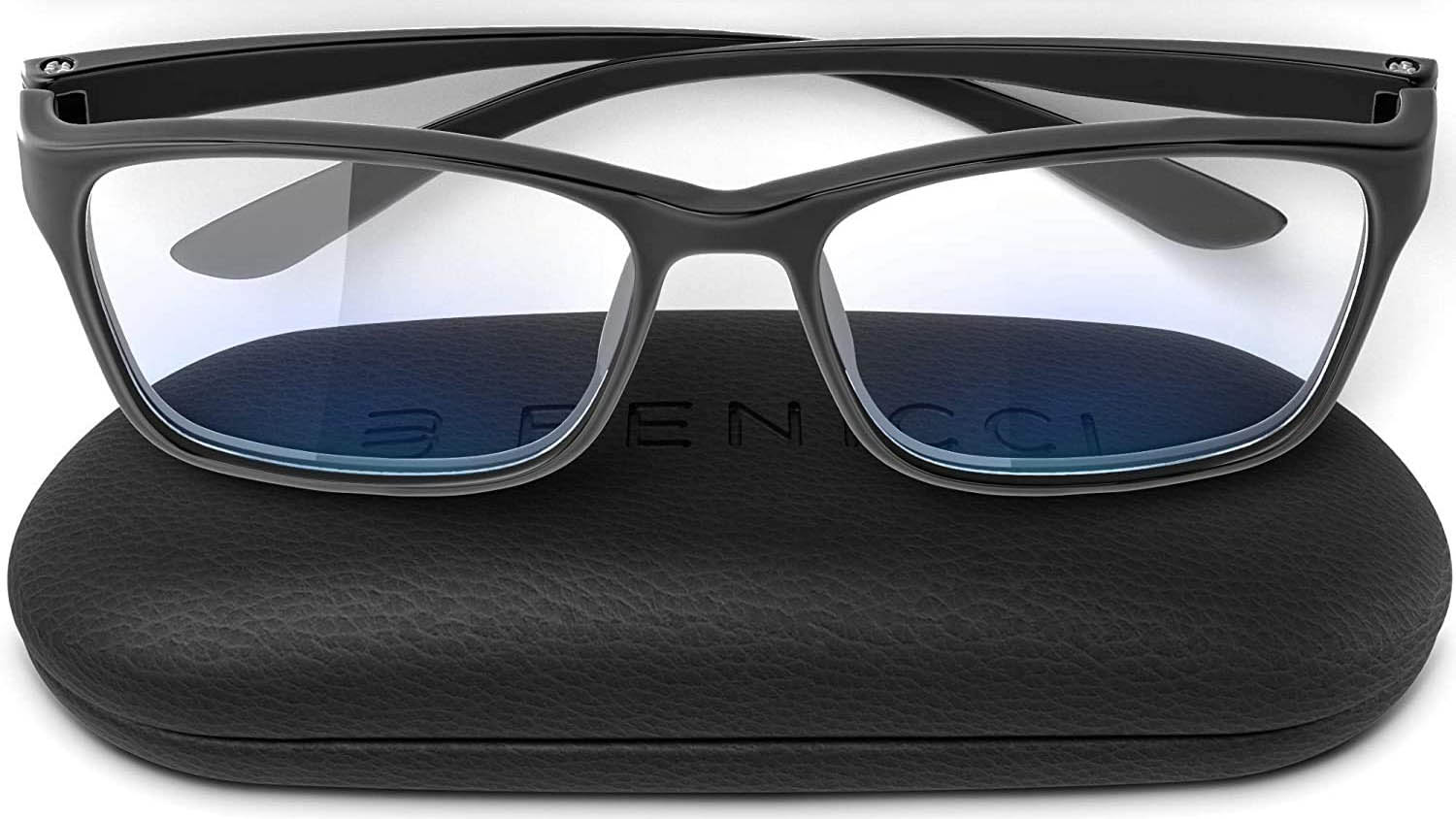Do Blue Light Glasses Help When Driving at Night?
Last Updated on

Have you ever noticed that you sleep much better when you don’t look at any screens for a few hours before going to bed? Of course, to experience this, you’d have to actually shut off all of your screens several hours before bedtime, and very few people do this today. But experts say that the blue light from our screens is affecting our brains. Companies listened, and the result is a new type of glasses known as blue light glasses.
The verdict is still out on this new technology. We haven’t been using it long enough to fully understand the potential effects. But many people are wearing these blue light glasses for the benefits that we do know about. If you’re one of these wearers, you might be wondering if your blue light glasses can help at other times, such as when you’re driving at night. In this article, we aim to answer that question so you can know as much as we do about your blue light glasses.

What Are Blue Light Glasses?
Since they’re so new, few people even know what blue light glasses are. These are special glasses designed to filter out blue light specifically. Blue light is emitted from our devices, including phones, tablets, computers, and televisions. This blue light affects our brains and can even prevent us from getting adequate sleep at night, which is why blue light glasses were invented. The idea is that by wearing blue light glasses, you can block the blue light from reaching your eyes, thus, avoiding its negative effects.

Claims About Blue Light Glasses
Now you understand what blue light glasses do, but what benefits are they supposed to provide to the wearer? First and foremost, they’re intended to help you sleep better by blocking the blue light that keeps your brain stimulated when it should be settling down. But that blue light can also be straining for the eyes, which experts believe can cause problems after years of staring at screens. As such, blue light glasses are meant to reduce eye strain and protect your vision.
Manufacturers make many claims about blue light glasses aside from the sensible idea of blocking the blue light that disrupts sleep patterns. Some claim that these glasses can also reduce headaches and even improve your body’s melatonin response. However, there’s no real proof of these claims at the moment. In fact, it hasn’t even been proven that the blue light from our screens is truly detrimental to our eyes long-term. Much remains to be seen.
Are Blue Light Glasses Safe?
Unfortunately, whenever new technology comes out, there’s a period of adjustment when we have to learn about its effects. Blue light glasses are no different. This is a new technology that hasn’t been in use for very long. As such, we don’t know a lot about the long-term effects of wearing blue light glasses. That said, there’s not any proof that currently indicates blue light glasses are damaging or unsafe.

But that doesn’t mean they’re necessary by any stretch of the imagination. In reality, many experts aren’t convinced of their efficacy. The American Academy of Ophthalmology, for instance, doesn’t recommend wearing these glasses. Instead, they suggest some common-sense tips such as keeping your face 25 inches from your screen and reducing screen glare with a matte screen filter.
Another reputable source, The College of Optometrists, says that the best scientific evidence we currently possess doesn’t support the use of these blue light blocking glasses. They say that these glasses have no evidence of alleviating eye fatigue or improving sleep quality.
Is Blue Light Bad?
Since so many people seem to be concerned with the effects of blue light exposure, you might be thinking that blue light is bad. After all, it does have a pretty bad reputation at the moment. But the truth is, you need blue light! Even the sun emits blue light, and it’s beneficial for us.
Blue light from the sun keeps our brains alert and functioning, helping us to feel awake. This is, naturally, the same reason that the blue light from our screens can have a negative impact on our sleep. The last thing you want before bed is to activate your brain and become more alert. But natural blue light is perfectly healthy and not something to be avoided.
Can Blue Light Glasses Help When Driving at Night?
At this point, you should have a basic understanding of blue light, its effects, and the glasses that are intended to block this spectrum of light. But will those blue light glasses be helpful when driving at night?
This is dependent on the specific glasses you’re wearing. As we mentioned, many reputable sources question the veracity of blue light glasses and the effects they’re purported to possess. However, some blue light glasses feature special anti-reflective coatings to reduce glare. These glasses can absolutely be beneficial while driving at night.
- Related read: Yellow “Night-Driving” Glasses: Do They Really Work?
At night, the lights from street lamps, buildings, and other vehicles can all create massive reflections on your windshield, making it difficult to see clearly. This is even worse when it’s raining! But if your blue light glasses have an anti-reflective coating, it could reduce the glare and reflections you have to deal with, offering you a clearer view during nighttime driving.
Does that mean that blue light glasses are helpful when driving at night? Not really. It means that anti-reflective coatings on your glasses can be beneficial. But the blue light blocking won’t have any pronounced effect on your night driving. If certain experts are to be believed, these glasses may never offer you a benefit!

So, Do Blue Light Glasses Help When Driving at Night?
As with most subjects, there’s a bit of controversy surrounding blue light glasses. It’s a fact that our screens emit blue light. Many experts believe this blue light is altering our sleep schedules and preventing us from getting the deep, restful sleep we require.
Manufacturers make all sorts of claims about blue light blocking glasses, suggesting that they can help you sleep better, reduce eye strain, and even help you drive at night. If your blue light glasses have an anti-reflective coating, then they might help with night driving. Otherwise, they won’t have any major effect. Some expert optometrists don’t believe these glasses can pose a benefit at all, bringing the manufacturers’ claims into question.
Featured Image Credit by: Syda Productions, Shutterstock
About the Author Jeff Weishaupt
Jeff is a tech professional by day, writer, and amateur photographer by night. He's had the privilege of leading software teams for startups to the Fortune 100 over the past two decades. He currently works in the data privacy space. Jeff's amateur photography interests started in 2008 when he got his first DSLR camera, the Canon Rebel. Since then, he's taken tens of thousands of photos. His favorite handheld camera these days is his Google Pixel 6 XL. He loves taking photos of nature and his kids. In 2016, he bought his first drone, the Mavic Pro. Taking photos from the air is an amazing perspective, and he loves to take his drone while traveling.
Related Articles:
How to Clean a Refractor Telescope: Step-by-Step Guide
How to Clean a Telescope Eyepiece: Step-by-Step Guide
How to Clean a Rifle Scope: 8 Expert Tips
Monocular vs Telescope: Differences Explained (With Pictures)
What Is a Monocular Used For? 8 Common Functions
How to Clean a Telescope Mirror: 8 Expert Tips
Brightfield vs Phase Contrast Microscopy: The Differences Explained
SkyCamHD Drone Review: Pros, Cons, FAQ, & Verdict
